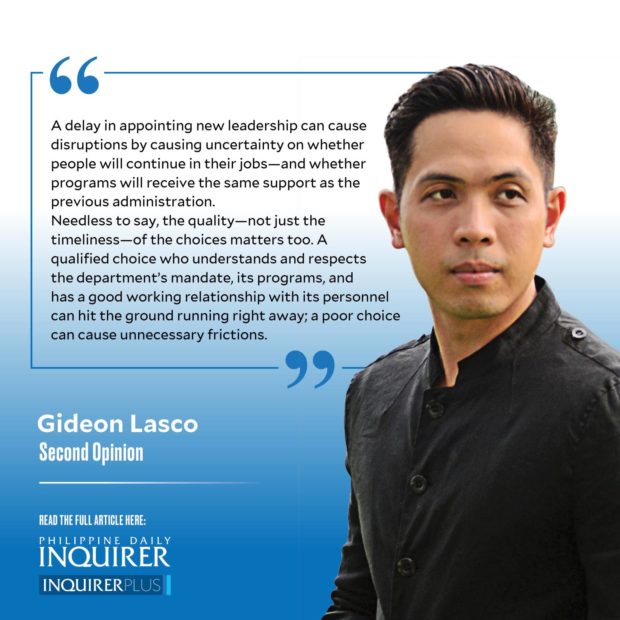Vergeire, OICs, and institutional (in)stability
Cabinet members and other political appointees come and go, but institutions remain, (ideally) continuing to perform the same vital (and often highly specialized) functions, regardless of who is at their helm.
The stability and strength of these institutions are what is at stake in the transition to a new government. On one hand, promptly appointed secretaries (and directors, chairpersons, etc.) can ensure both continuity (e.g., by reappointing those that need to be reappointed and interfacing between the President and their department) and necessary change (e.g., bringing in new people and ideas, embarking on reforms and new programs).
On the other hand, a delay in appointing new leadership can cause disruptions by causing uncertainty on whether people will continue in their jobs—and whether programs will receive the same support as the previous administration.
Needless to say, the quality—not just the timeliness—of the choices matters too. A qualified choice who understands and respects the department’s mandate, its programs, and has a good working relationship with its personnel can hit the ground running right away; a poor choice can cause unnecessary frictions.
Career officials, when designated as officers in charge (OIC) or in an “acting” capacity, are often very competent to lead their departments, equipped as they are with institutional knowledge. Without a full appointment, however, they are not legally and politically empowered to make important decisions. While continuity is often a good thing, sometimes government agencies need disruption, too, and an OIC will also not have the mandate to implement changes.
Importantly, moreover, career officials may not be keen to take on such a political position. Aside from winning over the President, they have to face the Commission on Appointments and risk being targeted by malicious demolition jobs, exposing not just themselves but their families. On top of that, if they get fired—or if they are not confirmed, as in the case of former Department of Health (DOH) secretary Paulyn Ubial—they cannot return to their previous position; they have effectively traded a permanent career post for a temporary (albeit more exalted) one.
The case of DOH—one of the two remaining departments without a Cabinet appointee—is illustrative. On July 14, Undersecretary Maria Rosario “Rosette” Vergeire—a highly respected public health practitioner and a familiar face throughout the pandemic—was named OIC.
Her designation was welcomed by the public health community, but the lack of a DOH secretary means many DOH officials will continue to face job insecurity and uncertainty. And as COVID-19 continues to evolve, it will prevent a kind of rethinking and reassessment that we need to calibrate our responses accordingly. Indeed, a full-fledged DOH secretary will be better suited to adjudicate the unresolved dilemmas of the pandemic—including how best to go about face-to-face classes, and whether to finally (and I think rightfully) lift outdoor mask mandates.
Moreover, a newly appointed health secretary will be much better placed to weigh in on vital and burning issues. For instance, in the wake of a disastrous drug war, a harm reduction-inspired DOH committed to pushing for drug policy reform will be a crucial voice. And as the new administration vows “build better more,” a prevention-minded DOH committed to walking and cycling infrastructure and green public spaces will likewise be most welcome.
In light of the above, I am calling on President Marcos Jr. to appoint a DOH secretary soonest. In a previous piece, I enumerated some qualities that are required of a health secretary—including the ability to consider various forms of expertise and resist political pressure (“Challenges for the next DOH secretary,” 6/3/2022)—and I believe that Vergeire herself is an excellent choice.
Beyond the DOH, however, the importance of institutional stability cuts across all government offices. On the part of the president, appointing qualified individuals (e.g., Department of Environment and Natural Resources’ Toni Yulo-Loyzaga and National Economic and Development Authority’s Arsenio M. Balisacan)—including career officials (e.g., Department of Foreign Affairs’ Enrique A. Manalo)—and giving them full support will go a long way in strengthening those institutions. The actions he will take in the coming weeks and months will also determine people’s willingness to work under his administration.
On the part of the Senate, eliminating the politicization of the confirmation process will also make it easier for qualified individuals—career officials or otherwise—to accept the call to serve.
Filipinos deserve the “best and the brightest” in all of our agencies, and our elected leaders must pave, not block, the way.
—————-
glasco@inquirer.com.ph





















